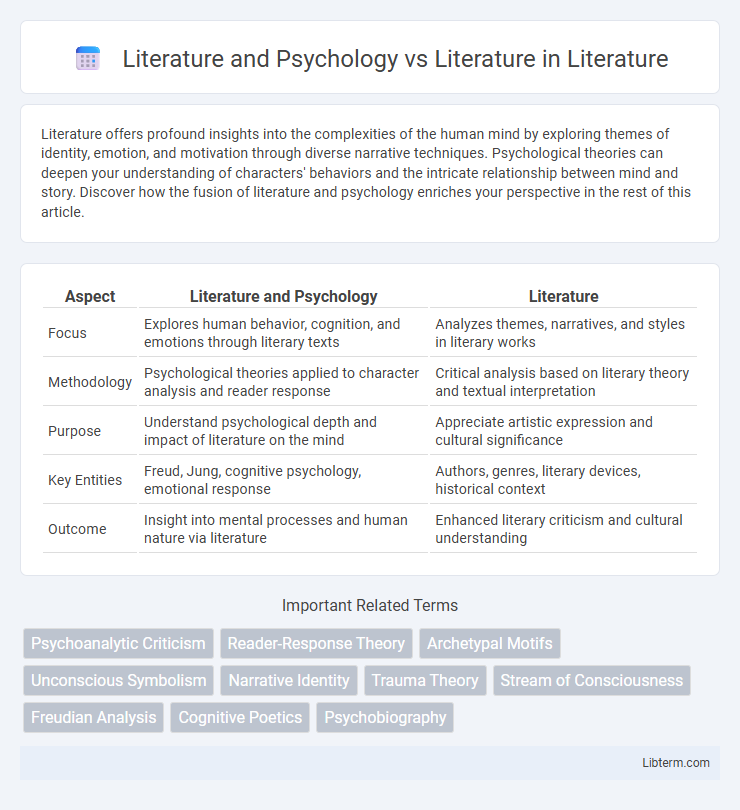Literature offers profound insights into the complexities of the human mind by exploring themes of identity, emotion, and motivation through diverse narrative techniques. Psychological theories can deepen your understanding of characters' behaviors and the intricate relationship between mind and story. Discover how the fusion of literature and psychology enriches your perspective in the rest of this article.
Table of Comparison
| Aspect | Literature and Psychology | Literature |
|---|---|---|
| Focus | Explores human behavior, cognition, and emotions through literary texts | Analyzes themes, narratives, and styles in literary works |
| Methodology | Psychological theories applied to character analysis and reader response | Critical analysis based on literary theory and textual interpretation |
| Purpose | Understand psychological depth and impact of literature on the mind | Appreciate artistic expression and cultural significance |
| Key Entities | Freud, Jung, cognitive psychology, emotional response | Authors, genres, literary devices, historical context |
| Outcome | Insight into mental processes and human nature via literature | Enhanced literary criticism and cultural understanding |
Introduction to Literature and Psychology
Introduction to Literature and Psychology explores the intersection between literary works and psychological theories, analyzing how human behavior and mental processes influence narrative structures and character development. This multidisciplinary approach enriches literary criticism by incorporating concepts such as cognitive psychology, psychoanalysis, and emotional response, providing deeper insight into themes, motifs, and authorial intent. Unlike traditional Literature studies, which concentrate solely on textual analysis and historical context, this field emphasizes the psychological dimensions underlying storytelling and reader engagement.
Historical Intersections of Literature and Psychology
Historical intersections of literature and psychology reveal how early psychological theories influenced narrative structures and character development in literature, shaping modern literary analysis. Classic texts by authors like Freud and Jung introduced archetypal symbols and unconscious motives that transformed storytelling and critical interpretations. The ongoing dialogue between psychological concepts and literary expression enriches understanding of human behavior and cultural contexts within literary works.
Defining the Psychological Approach in Literary Studies
The psychological approach in literary studies involves analyzing characters' mental states, motivations, and emotional conflicts through theories from psychology, such as psychoanalysis, behaviorism, and cognitive psychology. This method enhances understanding of narrative structures by exploring unconscious drives, symbolism, and identity formation within the text. Integrating psychological frameworks helps scholars interpret deeper meanings and the impact of literature on human psyche and culture.
Key Theories: Freud, Jung, and Modern Psychology in Literature
Literature and psychology intersect through key theories such as Freud's psychoanalysis, which explores unconscious desires and repression, and Jung's analytical psychology emphasizing archetypes and the collective unconscious influencing character development. Modern psychology in literature extends these theories by incorporating cognitive and behavioral models to analyze character motivations and narrative structures. This fusion enriches literary criticism by offering deeper insights into human behavior and emotional complexity within texts.
Psychological Analysis vs Traditional Literary Criticism
Psychological analysis in literature explores characters' motivations, unconscious drives, and emotional conflicts using theories from Freud, Jung, and contemporary psychology, offering deeper insights into the human psyche and narrative behavior. Traditional literary criticism emphasizes textual elements such as structure, genre, symbolism, and historical context to interpret meaning and aesthetic value. The contrast highlights psychological analysis' focus on inner mental states versus traditional criticism's attention to external literary devices and authorial intent.
Reader Response: Psychological Engagement with Texts
Reader response theory emphasizes the psychological interaction between readers and literary texts, highlighting how individual emotions, memories, and cognitive processes shape interpretation. Psychological engagement with literature involves tracking readers' mental states, such as empathy, imagination, and identification with characters, to uncover deeper narrative impacts. This approach diverges from traditional literary analysis by prioritizing the reader's subjective experience over authorial intent or textual structure.
Character Development through a Psychological Lens
Literature and psychology intersect significantly in exploring character development, where psychological theories illuminate motivations, unconscious desires, and internal conflicts driving characters' actions and growth. Through a psychological lens, literary analysis reveals nuanced personality traits and transformative experiences, enhancing readers' understanding of human behavior and emotional depth. This approach enriches character complexity by integrating concepts from psychoanalysis, cognitive psychology, and developmental theories into literary criticism.
Literature’s Role in Understanding Human Behavior
Literature serves as a profound tool for exploring human behavior by delving into characters' motivations, emotions, and psychological complexities, offering nuanced insights into the human psyche. Unlike psychology, which employs scientific methods to analyze behavior, literature provides subjective and culturally rich narratives that reveal the diversity of human experience and social contexts. This intersection enriches understanding by highlighting how storytelling reflects and shapes mental processes, emotional struggles, and interpersonal dynamics across various societies.
Comparative Case Studies: Pure Literature vs Psychological Interpretation
Comparative case studies reveal distinct analytical approaches in pure literature and psychological interpretation, with pure literature emphasizing narrative structure, thematic elements, and stylistic features, while psychological interpretation focuses on character motivations, subconscious drives, and mental health themes. Texts analyzed through psychological frameworks often utilize psychoanalytic theories or cognitive psychology to explore inner character complexities, contrasting with the formalist techniques predominant in pure literature studies. This divergence highlights how interdisciplinary methodologies enrich literary analysis by integrating psychological insights with traditional literary critique.
Conclusion: The Evolving Relationship Between Literature and Psychology
The evolving relationship between literature and psychology reveals a dynamic interplay where literary works offer profound insights into human behavior and mental processes, enriching psychological understanding beyond clinical frameworks. Literature serves as a narrative laboratory, allowing the exploration of psychological themes such as identity, trauma, and cognition through character development and plot. This synergy enhances both fields, fostering deeper empathy, critical thinking, and interdisciplinary research that continually reshapes interpretations of the human experience.
Literature and Psychology Infographic

 libterm.com
libterm.com